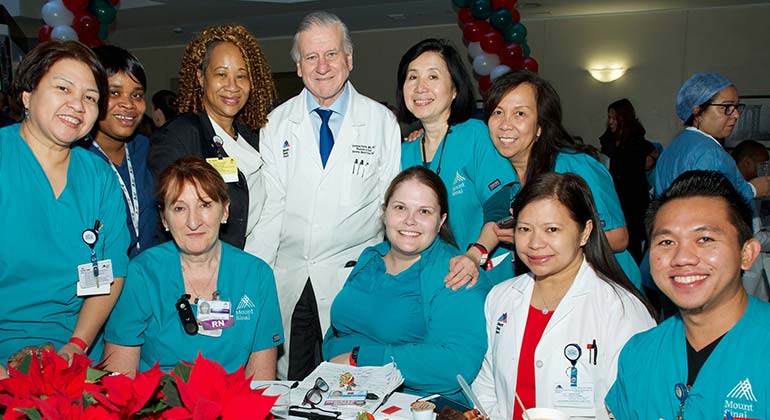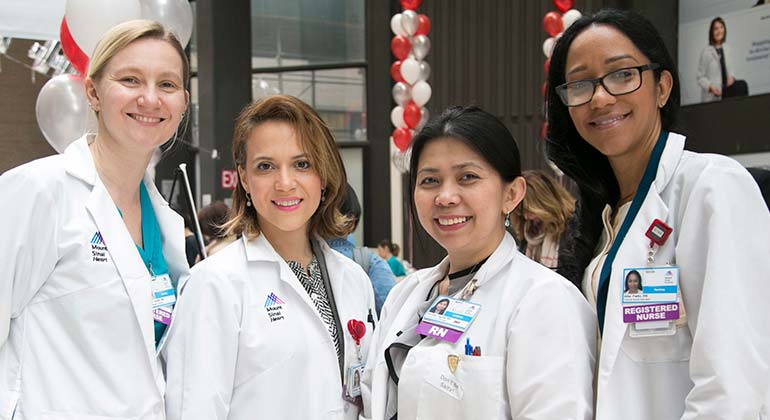Nursing





Mount Sinai Fuster Heart Hospital’s experienced and highly trained nurses care for both cardiac inpatients and outpatients. We have more than 350 nurses and 70 nurse practitioners on staff. Our nurses work with heart patients receiving primary and preventive care medicine as well as those getting highly specialized cardiology and cardiac surgery clinical care. We care for more than 50,000 heart patients a year.
The Mount Sinai Hospital has received Magnet designation from the American Nurses Credentialing Center (2004-2008, 2009-2013, and 2014-2018), a prestigious honor achieved by only 6 percent of hospitals in the United States. This gold-standard designation in nursing care represents the highest-quality of comprehensive patient care, associated with better patient outcomes, higher satisfaction and engagement among registered nurses (RNs), lower RN turnover, and greater patient satisfaction. Magnet-designated hospitals attract the most highly qualified nurses.
Almost all of Mount Sinai Fuster Heart Hospital’s nurses hold a Bachelor's degree in nursing, which is high above the national average of approximately 50 percent. In addition, we maintain an environment that supports professional development, interdisciplinary collaboration, and scholarship, enabling us to provide the highest quality, evidence based care. Our nurses are structurally empowered and autonomous and practice in a magnet work environment, where they go above and beyond what is required to expand their knowledge and skills by obtaining professional certifications, and pursing higher formal academic education.
Nurse Practitioners
Nurse practitioners also play a crucial, hybrid role at Mount Sinai Fuster Heart Hospital. Nurse practitioners are advanced practice nurses who build on their knowledge and experience to obtain additional education and certifications, enabling them to preform many of the same activities that a hospital doctor does. They work in a collaborative practice alongside physicians; diagnosing, ordering tests, evaluating results, prescribing medications, treating, evaluating outcomes, managing complex cardiovascular conditions, and monitoring responses to treatments. Their background in nursing provides them with a perspective on patient needs and communication skills that helps them care for the whole person.
Like our clinical nurses, Mount Sinai Fuster Heart Hospital’s nurse practitioners are actively involved in professional development and further formal academic education. They organize and sponsor an annual symposium for cardiology nurse practitioners. At this gathering, Mount Sinai nurse practitioners and physician colleagues address an audience of more than 300 medical professionals from around the country. Discussions focus on the prevention and management of cardiovascular disease from the perspective of a nurse practitioner, as well as updates on latest clinical guidelines, best practices and clinical research.
Specialized Training
Our nurses and nurse practitioners have specialized knowledge and skills in the following areas of heart/cardiology:
- Arrhythmia and Heart Rhythm Disorders: In addition to advanced cardiac life support certification, our nurses and nurse practitioners have specialized training and advanced skills in:
- Electrocardiogram (EKG) interpretation
- Using the latest equipment and technology
- Specialized patient assessment skills for diagnostic or treatment procedures
- Sedation and analgesia
- Patient education
- Delivery of safe, quality care
- Coronary Artery Disease: The nursing staff rounds hourly on each patient, meticulously assessing their patient vital signs, symptoms, stability, comfort, and satisfaction. The expertise our telemetry nurses and nurse practitioners have in EKG interpretation enables them to intervene immediately if abnormal heart rhythms do occur.
- Heart Failure and Transplantation: Heart failure is a chronic condition requiring coordination among many types of healthcare providers. Mount Sinai Fuster Heart Hospital nurses are experts in care coordination within the inpatient setting as well as after discharge. Our nurses are knowledgeable about heart failure and about helping patients perform self-management to help us achieve optimal outcomes. In our heart failure unit, nurses begin educating patients and coaching in self-care skills on the day of admission, and continues throughout hospitalization and in the setting. Our nurses are competent and skilled in caring for patients with advanced heart failure, using circulatory support devices such as left ventricular assist device and the total artificial heart, in which Mount Sinai was a New York area pioneer. Our nurses are also fully educated and skilled in providing comprehensive care for heart transplantation patients: prior to transplant, immediately post operatively, and long term.
- Interventional Cardiology/Cardiac Catheterization Laboratory: Nurses, according to Samin K. Sharma, MD, Director of Clinical and Interventional Cardiology at The Mount Sinai Hospital, are the "backbone of the Cath Lab" supporting the operation of the entire team. Each nurse has EKG and telemetry expertise, has completed a critical care course, has earned certification in Basic and Advanced Cardiac Life Support, is proficient in sedation, and has extensive experience with the complex tools involved in angioplasty and other cardiac interventions. Our nurses are highly skilled in caring for patients using the latest and most innovative interventional cardiology procedures, such as transcatheter aortic valve replacement, a minimally invasive procedure in which we replace the aortic valve via catheter, instead of in a full surgical procedure. The Cath Lab at The Mount Sinai Hospital consistently achieves highest scores for patient safety, and the nurses and nurse practitioners who are an integral part of the team are vital to these achievements.
- Cardiac Intensive Care and Step Down Unit (CICU/CSDU) at The Mount Sinai Hospital: Our nurses have special training in caring for heart patients. They are highly skilled in mechanical ventilation, advanced hemodynamic monitoring, pacemakers, intra-aortic balloon pumps, ventricular assist devices, and other important approaches. Our skills have been national recognized. In July 2018, the American Association of Critical Care Nurses gave us a gold-level Beacon Award for Excellence. This award recognizes high quality, evidence-based care that focuses on you, our patient, and your family. We are one of very few programs in the country to receive this award. In September 2018, there were only ten gold-Level Beacon units of any type in New York State. In the entire country, there were only eight gold-Level ICUs. The gold-level Beacon award is good for three years. We have a history of excellent heart patient care. We received the silver-level Beacon Award in 2014. We are the first and only Mount Sinai ICU with a Beacon award.
- Non-invasive Cardiology/Cardiac Imaging: Our cardiac imaging nurses use their advanced skills to ensure that stress testing and other non-invasive cardiac imaging tests are performed safely and accurately. They also provide patient education before, during, and after each test procedure.